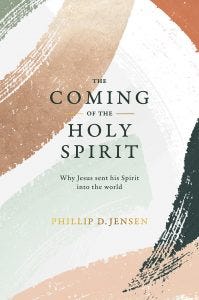I'm of an age that is young enough that I was not directly influenced by Phillip and Peter Jensen in Sydney Anglican circles, but their influence on the prior generation, and Sydney as a whole, is pervasive. There are things I like, and dislike, and disagree with, in their theology and practice. All of this is prologoumena to my actual comments on this actual book.
Here's what I like about this book - it's a book on the Holy Spirit that (a) takes biblical ways of talking seriously, (b) takes the contours of the Scripture seriously, (c)
So, instead of starting with "the person and work" of the Holy Spirit, or any number of traditional systemic approaches, or talking about gifts and other 'charismatic' stuff, Jensen plants his feet firmly in John's upper room discourse and leads you through Jesus' teaching about the coming of hte Holy Spirit in terms of the shift between the ages. He ties this to the OT promises, and sets you up to see how, after the death and resurrection of Jesus, the Holy Spirit will continue his ministry. I appreciate this approach because John 14-16 is (i) densely packed with teaching on the HS, and (ii) often overlooked as a starting point. Even in this section you feel Jensen's anti-charismatic edge - this is an author who (as I understand it) fought long and hard to stop Sydney Evangelicalism turning Charismatic, and that has left its mark. His points, however, are well made and well-founded.
Part 2 of the book then turns to follow the narrative of Acts and the age of the Spirit - how the Spirit's fulfilment of Jesus' promises in John 14-16 works itself out through the witness of the apostles and the Gospel going forth. This seems like an apropos place to mention how the book has 34 appendices - really short 1-2 page entries which tackle specific questions (Baptism with the Spirit, Speaking in tongues, Using biblical words biblically). These roughly follow the outline of the book as a whole, and so reading with two bookmarks isn't a bad idea! But, it's incredibly helpful to have gathered all in one place things like, "so, here are all the references to baptism in the Spirit in the New Testament, and here's how the NT seems to understand and use the phrase".
Part 3 turns to the epistles, particularly in relation to the mission shape of parts 1 and 2 - how do the letters attest and reinforce that reading of the coming of the Spirit in the work of the Gospel. It's only in part 4, then, that we get to the work of the Spirit in the lives of believers. And here, I think, we see something more of the genius of Jensen's approach. The primary work of the Spirit is seen in the shape of Christian life, individually and collectively. So, there's unity in the Spirit, in the church, and there's the fruit of the Spirit, which looks just like ordinary virtuous Christian living. This isn't showy or spectacular or anything, it's stock-standard back-to-basics learn to live more like Jesus. That's what the Spirit is primarily up to in Christians.
Only then does he turn to 1 Cor 12 and 14, those notoriously difficult passages that seem to speak to "spiritual gifts". Here the value of reading both the contours and the details of Scripture shine through. This isn't a text that speaks to spiritual gifts per se, it's a letter that speaks tot he problems in Corinth. And the problem in Corinth is precisely that they are deeply unspiritual by all the marks we have considered so far. And Paul's argument is, in part, that gifts are not a mark or sign of being spiritual at all. There's in fact no mention of gifts in ch 14, and two mentions of 'spirit' that are not clear references to the Holy Spirit. The mark of the Spirit's work is love (1 Cor 13) expressed in building others up, and the Corinthians are failing woefully at that.
All the focus on spiritual gifts, and on the 'spectacular', misses dreadfully what the Spirit primarily and pervasively does - bring people to faith in Jesus Christ and transform their lives through the new heart given to them and the new life welling up inside them. That's what it is to be a Spiritual person, a Spiritual church, and to see the Spirit at work.


